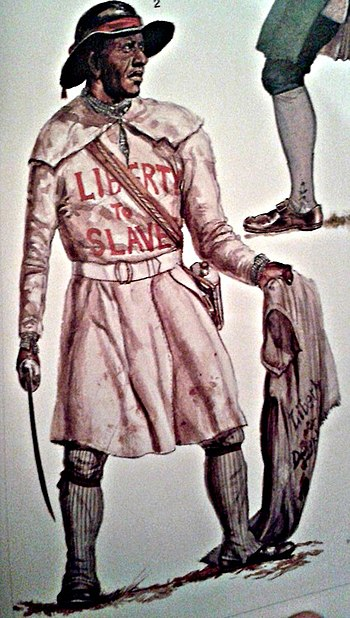Cornelius Titus, known as Colonel Tye, fought with the British army during the Revolutionary War. He was the leader of the “Black Brigade,” a volunteer corps of escaped slaves that became the greatest guerilla fighting force of the war.
Early Life
Cornelius Titus was born into slavery in Colt’s Neck, Monmouth County, New Jersey, around 1753. Although his owner, John Corlies, was a Quaker, Corlies did not follow the practice of educating slaves and emancipating them at the age of 21. Rather, he was known for his rigid discipline and poor treatment of his slaves.
In November of 1775, John Murray, the 4th Earl of Dunmore and Royal Governor of Virginia, issued a proclamation offering freedom to any indentured servant or enslaved African that escaped and joined the British army. Titus escaped to Virginia from New Jersey and joined Dunmore’s Ethiopian Regiment.
Revolutionary War
Poorly trained, the Ethiopian Regiment initially suffered heavy losses. However, during the Battle of Monmouth, Titus captured a captain of the Monmouth County militia and distinguished himself as fearless fighter. The British later bestowed on him the honorary title of Colonel, and he became known as Colonel Tye.
Tye’s leadership skills and bravery, combined with his intimate knowledge of the local area, were a valuable asset to the Crown. Tye and his men were tasked with destabilizing the region by carrying out raids targeting wealthy Patriots slave holders. Known as the “Black Brigade,” they attacked night, taking prisoners and confiscating supplies to aid British forces in New York City. They also worked to free all the slaves they encountered.
Over time, Tye and his brigade became the most notorious guerilla fighters on either side of the war. In the summer of 1780, Tye’s men raided Barnes Smock, a Patriot militia leader in Monmouth County, capturing 12 men and destroyed his artillery. The brigade also captured James Mott, the second major in the Monmouth’s militia regiment, James Johnson, a captain in the Hunterdon militia, and six other militia men.
Later Life
On September 1, 1780, Tye led a siege against Patriot Captain Joshua Huddy. Although the raid was successful, Tye was shot in the wrist with a musket ball during the battle and later died of tetanus. Even after his death, Tye’s impact on the war was recognized by both the British and the Americans. As described by historian Robert Mayers, “Many Americans contended that the war at the New Jersey shore would have been won much sooner had Tye been enlisted on their side. Others observed that had he lived on for the rest of the war, it would have been a disaster for the Patriots of Monmouth County.”






